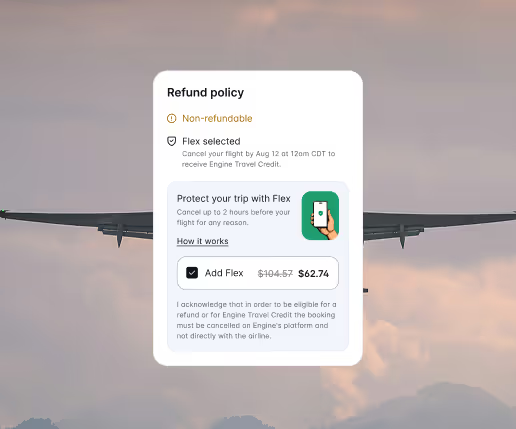What Is a Flexible Ticket? A Business Traveler’s Guide

Unexpected events happen all the time. Plans shift fast—and for work travelers, that often means unexpected costs and last-minute chaos.
The solution? Plan for the unexpected with flexible flights.
If you frequently face itinerary changes, understanding your options and how they work can make your contingency plans that much easier to action. Let’s dive into what a flexible ticket is and everything else you need to know about organizing flexible travel.
What Is A Flexible Ticket?
A flexible ticket is an airline booking that lets travelers adjust details like the departure date, time, and destination without penalty.
You'll see it sold under a few names like flexi flight, flexible fare or open ticket, but the promise is the same: You pay a bit more upfront to modify travel plans when schedules shift.
For those with shifting schedules, flying on a flexible ticket is an ideal choice. Flexible tickets allow you to have:
- Changeable dates and times (travelers can adjust plans as they go)
- Money saved on rebooking
- Refund options like full or partial cash back instead of airline credit
For project-based businesses, this also means that your budget is safe from last-minute change fees, admin work of rebooking is reduced, and your team continues moving with the project.
6 Types Of Flexible Tickets
Airlines offer a range of flexible ticket options, each with specific terms that cater to different travel needs. The choices vary by airline and may depend on when you book.
No matter the ticket type, from flexible dates to a fully refundable flight, review the fine print to ensure they meet your travel needs. Take a look at an overview.
1. Changeable/Modifiable Tickets
These let you shift departure time or date, usually for nothing more than the fare difference. It strikes a balance between cost and flexibility.
The airline waives its normal change fee on this fare class. Book them early, double-check the rules in the fare breakdown, and remind travelers they still need to rebook before the flight takes off.
2. Flexible Travel Dates Tickets
These tickets provide flyers with the option to change their departure or return date without a penalty, making it very flexible for business travelers.
You lock a fare today, but the date can slide forward or backward, often within a 30-day window. Airlines still require the same origin and destination, and seats have to be available. Keep an eye on blackout dates before you confirm.
3. Fully Refundable Tickets
Sometimes the whole trip gets canceled. Whether it is family illness, hospitalization, natural disasters or legal obligations, with a fully refundable fare, you cancel and pull the entire ticket value back to the travel budget.
The upfront price is higher, but you get all your money back to your account within a week. No vouchers or miles.
4. Cancel-For-Any-Reason Tickets
This is the premium option. You pay extra, but you can walk away from the booking for any reason.
Cancellation policies vary by carrier, and the percentage of the refunded fare (as cash or credit) depends on the carrier's rules. The catch: you must cancel a set number of hours before departure. Use it when project stakes are higher than the extra cost.
5. Open-Jaw Tickets
An open-jaw itinerary lets you land in one city and fly home from another on the same ticket, giving you the freedom to plan the most efficient route.
Picture this: You fly into Dallas for a regional inspection run, drive the corridor to hit three job sites, then catch your return flight out of Houston. One itinerary, no backtracking. Fewer receipts to chase.
By skipping the return leg to your arrival city, you cut down on wasted travel—and often save money while keeping the schedule loose.
6. Multiple Destination Tickets
This ticket allows for visits to multiple cities within one booking, making a complex travel itinerary much simpler with a single booking.
You can easily plan a multi-city flight where you fly into Denver, hop to Salt Lake, finish in Phoenix, then head home. Airlines price these by mileage, so compare against separate legs first.
Costs Of Flexible Tickets
Flexible tickets typically come at a higher price, but they can be more cost-effective in the long run, especially for frequent travelers. According to 2024 price data, this flexibility runs about 15% higher than a standard ticket.
Changing a basic economy fare, for instance, often incurs both a change fee and a rebooking fee: charges that may exceed the original ticket price.
Flexible tickets, however, allow travelers to adjust dates and times without penalty, making them ideal for unpredictable schedules.
In addition to flexibility, open tickets sometimes include added perks that justify the higher fare, such as loyalty points, preferred or upgraded seating, and travel credits.
Some airlines even grant business lounge access, priority boarding, or waived baggage fees: benefits that elevate the travel experience and can offset the initial expense.
For those traveling on business, these tickets offer a convenient way to manage costs while staying comfortable on the road.
When Flexible Tickets Make Business Sense
If your projects live at the mercy of weather reports, permit offices, or a clogged supply chain, paying extra for flexibility is a good way to protect your budget.
Construction crews lose days when a storm stalls concrete pours. Manufacturing teams sit idle while a machine part is stuck in customs. Energy jobs wait on regulators. Logistics schedules snap when a container is late.
In every case, a fixed ticket turns into a sunk cost the minute plans shift.
Here's a quick gut-check you can run before every booking:
- How likely is the schedule to slip? If it's more than 50%, you should flag this trip as high-risk
- Compare the flexible premium (≈15%) to the cost of losing the ticket plus a fare spike
- Take a personnel count. The more travelers you move, the faster the savings compound
If items 1-3 point to real risk, book the flexible fare.
Booking Flexible Travels: The Hard Way Vs. The Smart Way
You’ve figured out that flexible flights make sense for your crew. Now the question is: where do you actually book them?
Hunting Flexible Flights One Airline at a Time
You could do it the hard way: bounce between airline sites, dig through fare codes, and try to guess which ones actually let you change or cancel without a penalty.
Most airlines offer something labeled “Flex,” “Anytime,” or “Refundable”—but there’s no standard. One carrier lets you cancel for credit. Another lets you change once. Another hides restrictions in a five-paragraph fare policy. Every airline calls it something different. And figuring it out takes time you don’t have.
On top of that, you're booking each traveler manually. Tracking each ticket. Trying to align receipts with job numbers later. And if plans shift? You’re back online, rebooking everything from scratch—likely at a higher rate.
If you’re in construction, manufacturing, logistics, or energy, this kind of mess burns both your time and your budget. And it gets worse the more people you’re moving.
Booking Smart: One Platform, Built for Change
Engine gives you one place to book flights that flex with your schedule. No tab-hopping. No second-guessing the fare class. Just flight options you can sort by flexibility, tied to the right project from the start.
Every ticket you book through Engine is easy to manage—and if the job shifts, you’re not starting over.
At checkout, you can add Flex to eligible flights.

That means you can cancel non-refundable fares up to two hours before departure, no questions asked. It works with most major U.S. airlines and select international ones, without juggling separate loyalty logins or guessing what each airline’s policy allows.
So instead of wasting time searching for “refund rules” across five different carriers, you book once, adjust if needed, and keep the job moving.
Simplify Flight Booking the Way Your Projects Run
Flexible tickets are about protecting your time and budget. For crews that travel to job sites, deadlines don’t wait.
Engine was built for the kind of travel work that doesn’t live in spreadsheets. Flights that flex when schedules change. Tools that tie every ticket to a project code. One invoice instead of chasing folios.
Book smarter. Travel flexible. Sign up with Engine today.

Frequently Asked Questions
Are Fare Differences Covered With Flexible Tickets?
Flexible tickets scrap change fees, but you still cover any fare jump between old and new flight. Your crew's $400 seat gets rescheduled to a $470 departure—you pay $70, nothing else. If the new fare costs less, most airlines issue travel credit for future trips.
How Do Flexible Tickets Work For Group Bookings?
Booking flexible fares for a crew works, but only if you dodge airline group contracts that lock you into strict rules. Reserve seats individually or in small blocks or book with Engine to avoid all these booking hassles.
Do Flexible Tickets Guarantee Seat Availability?
Flexibility lets you switch flights, not conjure empty seats. The change only goes through if the new departure still has space in the same fare bucket. Rebook as soon as the schedule shifts .
What's The Difference Between Refundable And Flexible Tickets?
Refundable means you cancel, walk away, and get the money back. Flexible means you keep traveling but pick a different flight. Refundable fare protects cash flow, flexible fare protects schedules. Choose refunds when a project might die, flexibility when timing is the question.



.jpg)

.jpg)

.jpg)

.avif)



.avif)

.jpg)

.avif)


















.avif)


.avif)

